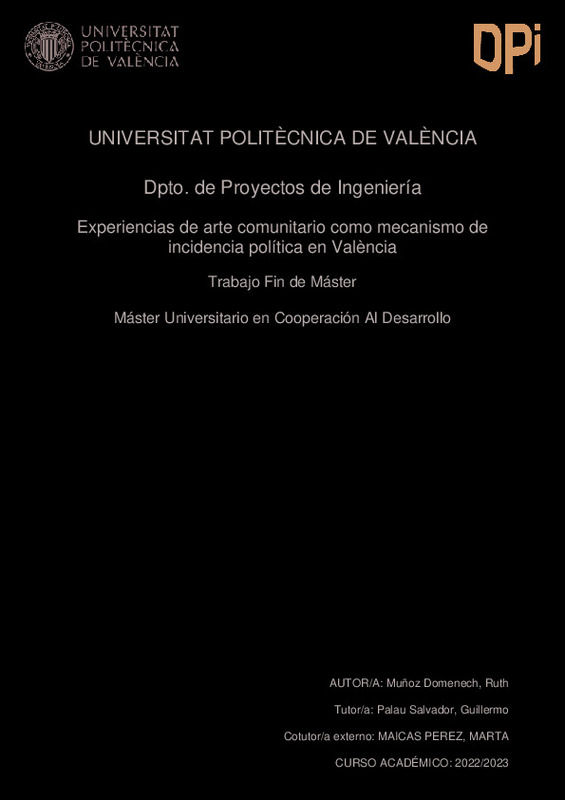|
Resumen:
|
[ES] Esta investigación analiza el arte comunitario como una herramienta de empoderamiento colectivo a través de acciones de incidencia política en el espacio público. Para ello, se llevan a cabo dos procesos participativos ...[+]
[ES] Esta investigación analiza el arte comunitario como una herramienta de empoderamiento colectivo a través de acciones de incidencia política en el espacio público. Para ello, se llevan a cabo dos procesos participativos junto a dos colectivos sociales de la ciudad de València: la Assemblea Feminista Poblats Marítims-Algirós y un grupo de personas creado alrededor de la iniciativa de agricultura urbana Cabanyal Horta.
El estudio se enmarca en las teorías de arte comunitario, co-creación de narrativas alternativas y capacidades colectivas. Desde esta base teórica, se plantean tres objetivos específicos: realizar procesos de arte comunitario relacionados con las reivindicaciones de los colectivos, analizar el impacto de estos procesos en la agenda política de los grupos y profundizar en las características de cada proceso de arte comunitario.
El espacio donde se construye la investigación se sitúa desde el paradigma participativo-emancipador y la teoría crítica, con un enfoque feminista transversal. Busca promover la agencia colectiva como herramienta de cambio social en contextos de tensiones sociales y ambientales. Se utiliza una metodología de Investigación-Acción Feminista, y la fase de acción, basada en procesos de arte comunitario, se ha llevado a cabo durante los meses de noviembre de 2022 a mayo de 2023. Con la participación se busca transformar la realidad de lo colectivos involucrados y contribuir al cambio social liderado por ellos mismos.
Los procesos de arte comunitario respaldan las reivindicaciones de los grupos al empoderarlos y proporcionarles herramientas creativas para la acción política. Estos procesos, al generar narrativas alternativas que desafían los discursos dominantes, fomentan la participación ciudadana y fortalecen la cohesión social. Gracias al arte comunitario, los grupos pueden cuestionar sus prácticas habituales y ampliar su capacidad de agencia, fortaleciendo así sus vínculos con organizaciones aliadas y aumentando su visibilidad pública. Este estudio contribuye a la comprensión de cómo el arte comunitario puede ser una herramienta efectiva para el cambio social y ofrece recomendaciones para futuros proyectos en esta área, promoviendo un enfoque ético, inclusivo y transformador.
[-]
[EN] This research analyses community art as a tool for collective empowerment through political advocacy actions in the public space. To this end, two participatory processes are carried out with two social collectives ...[+]
[EN] This research analyses community art as a tool for collective empowerment through political advocacy actions in the public space. To this end, two participatory processes are carried out with two social collectives in the city of Valencia: the Assemblea Feminista Poblats Marítims-Algirós and a group of people created around the Cabanyal Horta urban agriculture initiative. The study is framed within the theories of community art, co-creation of alternative narratives and collective capacities. From this theoretical basis, three specific objectives are set out: to carry out community art processes related to the demands of the collectives, to analyse the impact of these processes on the political agenda of the groups and to study in depth the characteristics of each community art process. The space in which the research is constructed is based on the participatory-emancipatory paradigm and critical theory, with a transversal feminist approach. It seeks to promote collective agency as a tool for social change in contexts of social and environmental tensions. It uses a Feminist Action Research methodology, and the action phase, based on community art processes, has been carried out during the months of November 2022 to May 2023. The aim of participation is to transform the reality of the collectives involved and contribute to social change led by them. The community art processes support the demands of the groups by empowering them and providing them with creative tools for political action. By generating alternative narratives that challenge dominant discourses, these processes encourage citizen participation and strengthen social cohesion. Through community art, groups are able to question their usual practices and expand their capacity for agency, thus strengthening their links with partner organisations and increasing their public visibility. This study contributes to the understanding of how community art can be an effective tool for social change and offers recommendations for future projects in this area, promoting an ethical, inclusive and transformative approach.
[-]
|








